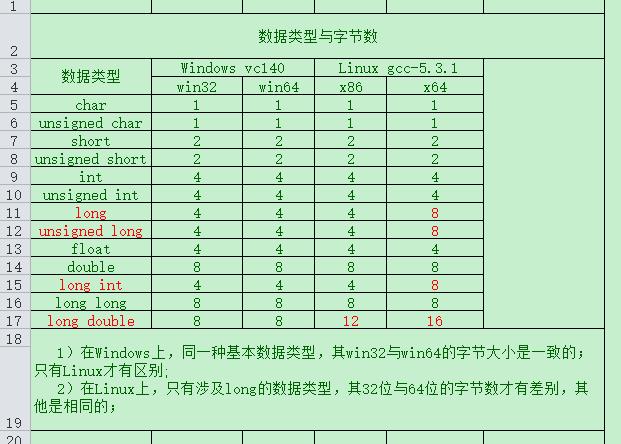C++基本数据类型的字节数范围大小溢出处理
Posted sanqima
tags:
篇首语:本文由小常识网(cha138.com)小编为大家整理,主要介绍了C++基本数据类型的字节数范围大小溢出处理相关的知识,希望对你有一定的参考价值。
C++有几种基本的数据类型:char、int、float、double,这些数据类型的字节数、范围大小根据操作系统、编译器的不同而不同。

- 在Windows上,同一种基本数据类型,其win32与win64的字节数是一致的;比如,int在win32、win64都是4个字节。
- 在Linux上,大部分基本数据类型,其32位与64位的字节数是一致的;只有long类型的不相同(当然,long long除外,long long在32位、64位的Linux上,都是8字节)。比如,float在32位、64位的Linux上,都是4个字节;double在32位、64位的Linux上都是8个字节。
当前,在Windows,有些复合数据类型,在不同位数上,其字节数是不同的。比如,string、size_t这类复合数据类型,string在win32上占28个字节,而在win64位上占40个字节。size_t在win32上占4个字节,而在win64位上占8个字节。
1、Windows系统
1.1 32位的编译器
32位 Windows上的数据类型与范围
type: ************size**************
bool: 所占字节数:1 最大值:1 最小值:0
char: 所占字节数:1 最大值:127 最小值:-128
signed char: 所占字节数:1 最大值:127 最小值:-128
unsigned char: 所占字节数:1 最大值:255 最小值:0
wchar_t: 所占字节数:2 最大值:65535 最小值:0
short: 所占字节数:2 最大值:32767 最小值:-32768
int: 所占字节数:4 最大值:2147483647 最小值:-2147483648
unsigned: 所占字节数:4 最大值:4294967295 最小值:0
long: 所占字节数:4 最大值:2147483647 最小值:-2147483648
unsigned long: 所占字节数:4 最大值:4294967295 最小值:0
double: 所占字节数:8 最大值:1.79769e+308 最小值:2.22507e-308
long double: 所占字节数:8 最大值:1.79769e+308 最小值:2.22507e-308
float: 所占字节数:4 最大值:3.40282e+38 最小值:1.17549e-38
size_t: 所占字节数:4 最大值:4294967295 最小值:0
string: 所占字节数:28
type: ************size**************
1.2 64位的编译器
64位 Windows上的数据类型与范围
type: ************size**************
bool: 所占字节数:1 最大值:1 最小值:0
char: 所占字节数:1 最大值:127 最小值:-128
signed char: 所占字节数:1 最大值:127 最小值:-128
unsigned char: 所占字节数:1 最大值:255 最小值:0
wchar_t: 所占字节数:2 最大值:65535 最小值:0
short: 所占字节数:2 最大值:32767 最小值:-32768
int: 所占字节数:4 最大值:2147483647 最小值:-2147483648
unsigned: 所占字节数:4 最大值:4294967295 最小值:0
long: 所占字节数:4 最大值:2147483647 最小值:-2147483648
unsigned long: 所占字节数:4 最大值:4294967295 最小值:0
double: 所占字节数:8 最大值:1.79769e+308 最小值:2.22507e-308
long double: 所占字节数:8 最大值:1.79769e+308 最小值:2.22507e-308
float: 所占字节数:4 最大值:3.40282e+38 最小值:1.17549e-38
size_t: 所占字节数:8 最大值:18446744073709551615 最小值:0
string: 所占字节数:40
type: ************size**************
Windows获取数据类型的字节数、范围大小的案例程序,如下:
//getSize.cpp
#include<iostream>
#include <limits>
using namespace std;
int main()
cout << "type: \\t\\t" << "************size**************" << endl;
cout << "bool: \\t\\t" << "所占字节数:" << sizeof(bool);
cout << "\\t最大值:" << (numeric_limits<bool>::max)();
cout << "\\t\\t最小值:" << (numeric_limits<bool>::min)() << endl;
cout << "char: \\t\\t" << "所占字节数:" << sizeof(char);
cout << "\\t最大值:" << (int)(numeric_limits<char>::max)();
cout << "\\t\\t最小值:" << (int)(numeric_limits<char>::min)() << endl;
cout << "signed char: \\t" << "所占字节数:" << sizeof(signed char);
cout << "\\t最大值:" << (int)(numeric_limits<signed char>::max)();
cout << "\\t\\t最小值:" << (int)(numeric_limits<signed char>::min)() << endl;
cout << "unsigned char: \\t" << "所占字节数:" << sizeof(unsigned char);
cout << "\\t最大值:" << (int)(numeric_limits<unsigned char>::max)();
cout << "\\t\\t最小值:" << (int)(numeric_limits<unsigned char>::min)() << endl;
cout << "wchar_t: \\t" << "所占字节数:" << sizeof(wchar_t);
cout << "\\t最大值:" << (numeric_limits<wchar_t>::max)();
cout << "\\t\\t最小值:" << (numeric_limits<wchar_t>::min)() << endl;
cout << "short: \\t\\t" << "所占字节数:" << sizeof(short);
cout << "\\t最大值:" << (numeric_limits<short>::max)();
cout << "\\t\\t最小值:" << (numeric_limits<short>::min)() << endl;
cout << "int: \\t\\t" << "所占字节数:" << sizeof(int);
cout << "\\t最大值:" << (numeric_limits<int>::max)();
cout << "\\t最小值:" << (numeric_limits<int>::min)() << endl;
cout << "unsigned: \\t" << "所占字节数:" << sizeof(unsigned);
cout << "\\t最大值:" << (numeric_limits<unsigned>::max)();
cout << "\\t最小值:" << (numeric_limits<unsigned>::min)() << endl;
cout << "long: \\t\\t" << "所占字节数:" << sizeof(long);
cout << "\\t最大值:" << (numeric_limits<long>::max)();
cout << "\\t最小值:" << (numeric_limits<long>::min)() << endl;
cout << "unsigned long: \\t" << "所占字节数:" << sizeof(unsigned long);
cout << "\\t最大值:" << (numeric_limits<unsigned long>::max)();
cout << "\\t最小值:" << (numeric_limits<unsigned long>::min)() << endl;
cout << "double: \\t" << "所占字节数:" << sizeof(double);
cout << "\\t最大值:" << (numeric_limits<double>::max)();
cout << "\\t最小值:" << (numeric_limits<double>::min)() << endl;
cout << "long double: \\t" << "所占字节数:" << sizeof(long double);
cout << "\\t最大值:" << (numeric_limits<long double>::max)();
cout << "\\t最小值:" << (numeric_limits<long double>::min)() << endl;
cout << "float: \\t\\t" << "所占字节数:" << sizeof(float);
cout << "\\t最大值:" << (numeric_limits<float>::max)();
cout << "\\t最小值:" << (numeric_limits<float>::min)() << endl;
cout << "size_t: \\t" << "所占字节数:" << sizeof(size_t);
cout << "\\t最大值:" << (numeric_limits<size_t>::max)();
cout << "\\t最小值:" << (numeric_limits<size_t>::min)() << endl;
cout << "string: \\t" << "所占字节数:" << sizeof(string) << endl;
// << "\\t最大值:" << (numeric_limits<string>::max)() << "\\t最小值:" << (numeric_limits<string>::min)() << endl;
cout << "type: \\t\\t" << "************size**************" << endl;
system("pause");
return 0;
2、Linux系统
2.1 32位编译器
32位 Linux上的数据类型与范围
type: ************size**************
bool: 所占字节数:1 最大值:1 最小值:0
char: 所占字节数:1 最大值:Del 最小值:€
signed char: 所占字节数:1 最大值:Del 最小值:€
unsigned char: 所占字节数:1 最大值:255 最小值:0
wchar_t: 所占字节数:2 最大值:65535 最小值:0
short: 所占字节数:2 最大值:32767 最小值:-32768
int: 所占字节数:4 最大值:2147483647 最小值:-2147483648
unsigned: 所占字节数:4 最大值:4294967295 最小值:0
long: 所占字节数:4 最大值:2147483647 最小值:-2147483648
unsigned long: 所占字节数:4 最大值:4294967295 最小值:0
double: 所占字节数:8 最大值:1.79769e+308 最小值:2.22507e-308
long double: 所占字节数:8 最大值:1.79769e+308 最小值:2.22507e-308
float: 所占字节数:4 最大值:3.40282e+38 最小值:1.17549e-38
size_t: 所占字节数:4 最大值:4294967295 最小值:0
string: 所占字节数:28
2.2 64位编译器
64位 Linux上的数据类型与范围
type: ************size**************
bool: 所占字节数:1 最大值:1 最小值:0
char: 所占字节数:1 最大值:DEL 最小值:€
signed char: 所占字节数:1 最大值:DEL 最小值:€
unsigned char: 所占字节数:1 最大值:255 最小值:0
wchar_t: 所占字节数:2 最大值:65535 最小值:0
short: 所占字节数:2 最大值:32767 最小值:-32768
int: 所占字节数:4 最大值:2147483647 最小值:-2147483648
unsigned: 所占字节数:4 最大值:4294967295 最小值:0
long: 所占字节数:8 最大值:9223372036854775807 最小值:-9223372036854775807
unsigned long: 所占字节数:8 最大值:18446744073709551615 最小值:0
double: 所占字节数:8 最大值:1.79769e+308 最小值:2.22507e-308
long double: 所占字节数:8 最大值:1.79769e+308 最小值:2.22507e-308
float: 所占字节数:4 最大值:3.40282e+38 最小值:1.17549e-38
size_t: 所占字节数:8 最大值:18446744073709551615 最小值:0
string: 所占字节数:40
type: ************size**************
3、越界与溢出
当变量的取值超过其最大值时,如果再加1,则出现越界,变量会从最大值变为最小值,即 MAX+1 → MIN,这里以Windows 64位上的long、int的最大值越界为例,进行说明。
long、int的最大值都为2147483647,若再加1,则出现越界,直接变成最小值 -2147483648,如图表(1)所示:
| 最大值 Max | Max+1(上溢) | 最小值 Min | Min-1(下溢) | |
|---|---|---|---|---|
| bool | 1 | 1 | 0 | 1 |
| char | 127 | -128 | -128 | 127 |
| signed char | 127 | -128 | -128 | 127 |
| unsigned char | 255 | 0 | 0 | 255 |
| wchar_t | 65535 | 0 | 0 | 65535 |
| short | 32767 | -32768 | -32768 | 32767 |
| int | 2147483647 | -2147483648 | -2147483648 | 2147483647 |
| unsigned | 4294967295 | 0 | 0 | 4294967295 |
| long | 2147483647 | -2147483648 | -2147483648 | 2147483647 |
| unsigned long | 4294967295 | 0 | 0 | 4294967295 |
注意,bool在C++中是使用unsigned int表示的,所以bool的最大值加1不会溢出(1+1 < 4294967295 ),要加上unsigned int的最大值4294967295才会上溢出变为0(1+ 4294967295溢出,变为0)。
//LongMax.cpp
#include<iostream>
#include <limits>
using namespace std;
#pragma warning(disable:4804)
#pragma warning(disable:4146)
void LongMax()
cout << "bool: \\t\\t" << "所占字节数:" << sizeof(bool);
cout << "\\t最大值:" << (numeric_limits<bool>::max)();
cout << "\\t\\t最小值:" << (numeric_limits<bool>::min)() << endl;
cout << "char: \\t\\t" << "所占字节数:" << sizeof(char);
cout << "\\t最大值:" << (int)(numeric_limits<char>::max)();
cout << "\\t\\t最小值:" << (int)(numeric_limits<char>::min)() << endl;
cout << "signed char: \\t" << "所占字节数:" << sizeof(signed char);
cout << "\\t最大值:" << (int)(numeric_limits<signed char>::max)();
cout << "\\t\\t最小值:" << (int)(numeric_limits<signed char>::min)() << endl;
cout << "unsigned char: \\t" << "所占字节数:" << sizeof(unsigned char);
cout << "\\t最大值:" << (int)(numeric_limits<unsigned char>::max)();
cout << "\\t\\t最小值:" << (int)(numeric_limits<unsigned char>::min)() << endl;
cout << "short: \\t\\t" << "所占字节数:" << sizeof(short);
cout << "\\t最大值:" << (numeric_limits<short>::max)();
cout << "\\t\\t最小值:" << (numeric_limits<short>::min)() << endl;
cout << "int: \\t\\t" << "所占字节数:" << sizeof(int);
cout << "\\t最大值:" << (numeric_limits<int>::max)();
cout << "\\t最小值:" << (numeric_limits<int>::min)() << endl;
cout << "unsigned int:\\t" << "所占字节数:" << sizeof(unsigned int);
cout << "\\t最大值:" << (numeric_limits<unsigned>::max)();
cout << "\\t最小值:" << (以上是关于C++基本数据类型的字节数范围大小溢出处理的主要内容,如果未能解决你的问题,请参考以下文章